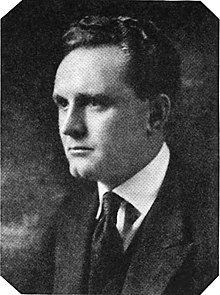弗蘭克·鮑沙其
外观
(重定向自弗兰克·柏塞奇)

弗蘭克·鮑沙其(英語:Frank Borzage,/bɔːrˈzeɪɡiː/,1894年4月23日—1962年6月19日)[1]是一位美國導演。
生平
[编辑]弗蘭克·鮑沙其在整個1920年代是一個相當成功的導演,達到在20世紀默片時代與早期有聲電影的高峰。弗蘭克·鮑沙其從德國導演茂瑙吸收視覺技巧。他發展出自己的電影風格,蔥鬱的視覺浪漫主義獲得巨大成功,他與珍妮·蓋諾和查爾斯·法雷爾(Charles Farrell)合作,包括《第七天堂》(1927年,為他贏得第一個奧斯卡獎),《馬路天使》(1928年)和《幸運星》(1929年)。1931年,他贏得第二個奧斯卡獎。
1948年後,他的電影產量不多。
在1955年和1957年,弗蘭克·鮑沙其獲得喬治·伊士曼獎[2]。
參考資料
[编辑]- ^ Borzage told The Literary Digest his name was pronounced "in three syllables, and g in get, bor-zay'gee." (Charles Earle Funk, What's the Name, Please?, Funk & Wagnalls, 1936.)
- ^ 存档副本. [2012-04-15]. (原始内容存档于2012-04-15).
外部連結
[编辑]- 弗蘭克·鮑沙其在互联网电影资料库(IMDb)上的資料(英文)
- 弗蘭克·鮑沙其在豆瓣上的资料(简体中文)
- 在AllMovie上弗蘭克·鮑沙其的頁面(英文)
- Senses of Cinema: Great Directors Critical Database (页面存档备份,存于互联网档案馆)
- They Shoot Pictures, Don't They? (页面存档备份,存于互联网档案馆)
- A Farewell to Arms (1932) – This Borzage-directed adaptation of Ernest Hemingway's novel has fallen into the public domain and is available online through the Internet Archive.
- Frank Borzage and the Classic Hollywood Style (页面存档备份,存于互联网档案馆)
- 在Find a Grave上的弗蘭克·鮑沙其
- Frank Borzage (页面存档备份,存于互联网档案馆) at Virtual History
